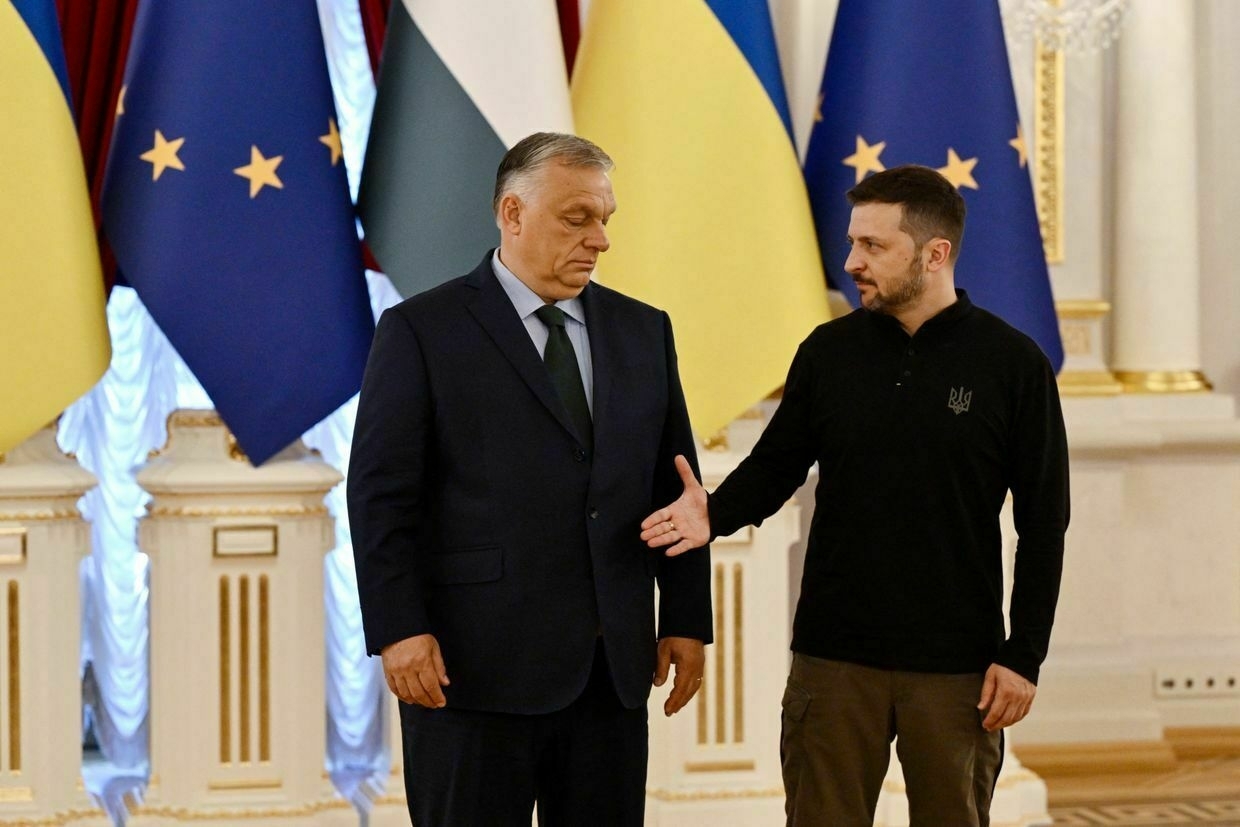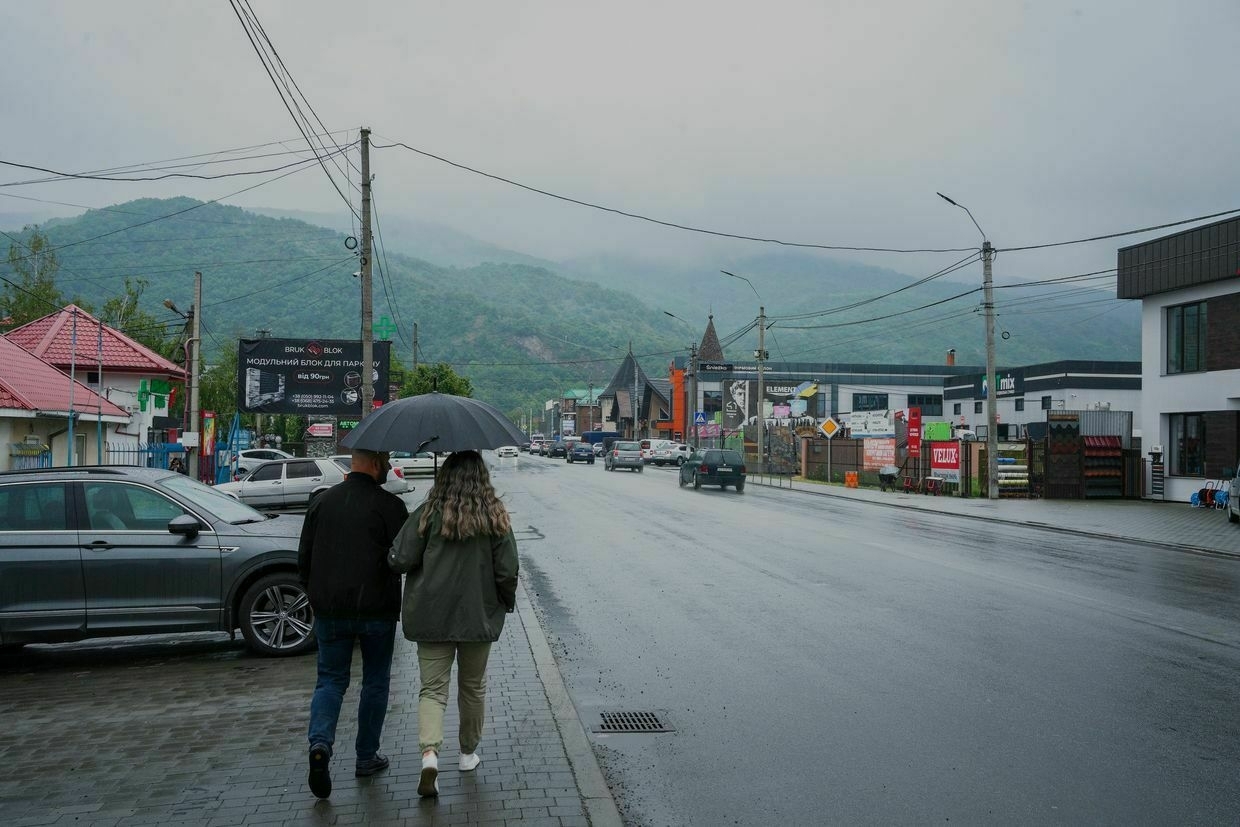
BEREHOVE, Zakarpattia Oblast — Thin gray smoke drifts beyond the patchwork of Soviet-era apartment blocks, historical buildings, and hillside vineyards that make up Berehove — the heart of the Hungarian community in Ukraine’s westernmost Zakarpattia Oblast.
“That’s Hungary, over there,” gestures Vitalii Antipov, a member of the local council, toward the not-so-distant horizon. He stands on top of a hill adorned by a massive white cross with a makeshift inscription thanking the Ukrainian Armed Forces.
A Ukrainian flag fluttering on a pole nearby is accompanied, as is common here, by a Hungarian tricolor.
Living on Ukraine’s western border, the Hungarians of Zakarpattia — a region also known as Transcarpathia — have shared this land for centuries with Ukrainians, Romanians, and others, forming a unique and multifaceted community.
In more recent years, they found themselves a key tool in Viktor Orban’s power play against Kyiv. Zakarpattia also took center stage in an unprecedented spying scandal, with Ukraine claiming to have uncovered a Hungarian espionage network in the region.
“Hungary’s influence (in Zakarpattia) is not anything new… and will likely remain,” Antipov acknowledges. He himself is of both Ukrainian and Hungarian descent, sharing a connection to the two groups that often overlap here.
"The war has changed a lot in the minds and hearts of the Hungarian community."

A portrait of Vitalii Antipov in Berehove, Zakarpattia Oblast, Ukraine on May 22, 2025. (Elena Kalinichenko/The Kyiv Independent)
But far from the simplistic image presented by Budapest, Ukraine's Hungarians have reacted differently to recent challenges, namely the war: while some have fled westward into Europe, seeking safety and stability, others have taken up arms, driven by a sense of duty and solidarity.
"The war has changed a lot in the minds and hearts of the Hungarian community," Antipov says.
"I felt it. In Berehove, Vynohradiv, in small villages, everywhere there are families whose sons are fighting, whose relatives have joined the Armed Forces of Ukraine or are helping as volunteers – even Hungarians."
Orban's influence in Zakarpattia
The border, now only a few kilometers from the town, has been shifting through the ages.
Zakarpattia changed hands over the course of the 20th century: Austria-Hungary, Czechoslovakia, short-lived Carpathian Ukraine, and then Hungary, until it was annexed by the Soviet Union in 1945. Later, it became the westernmost frontier of the independent Ukrainian state.
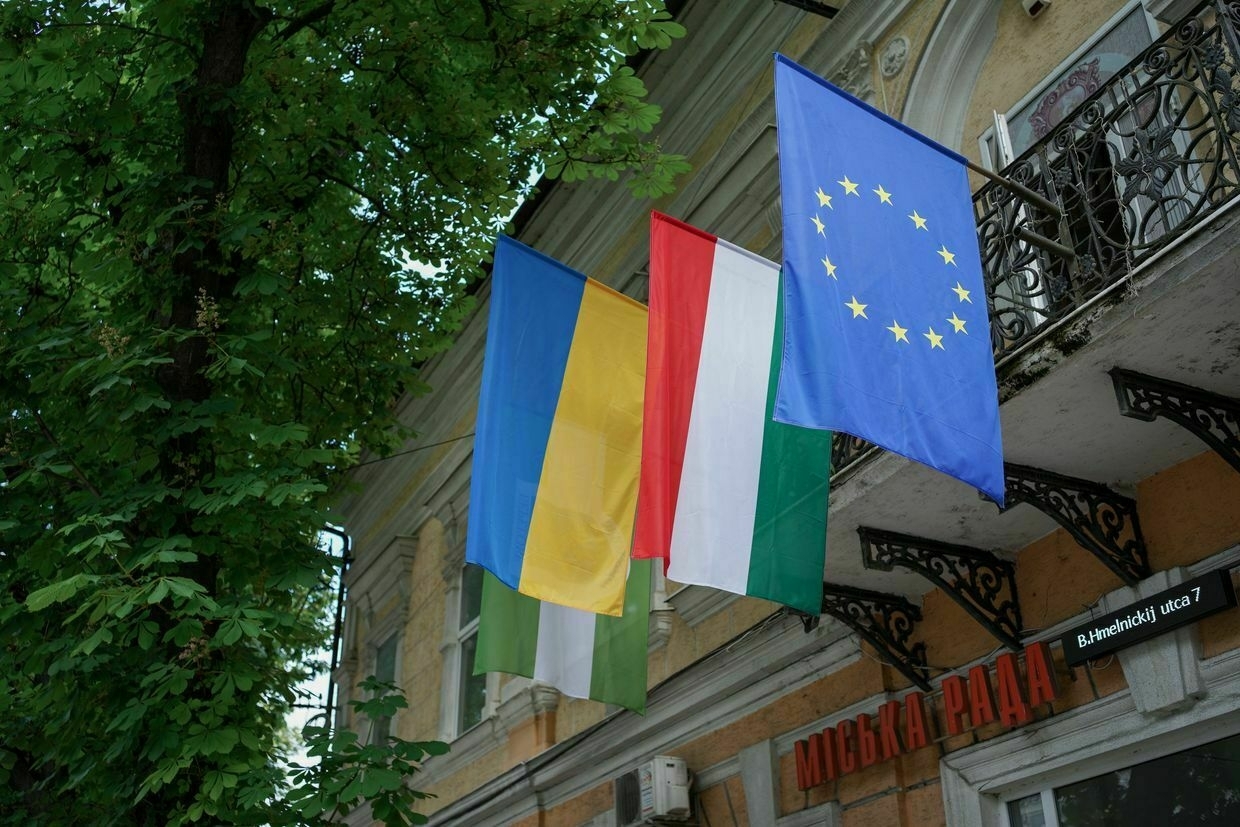
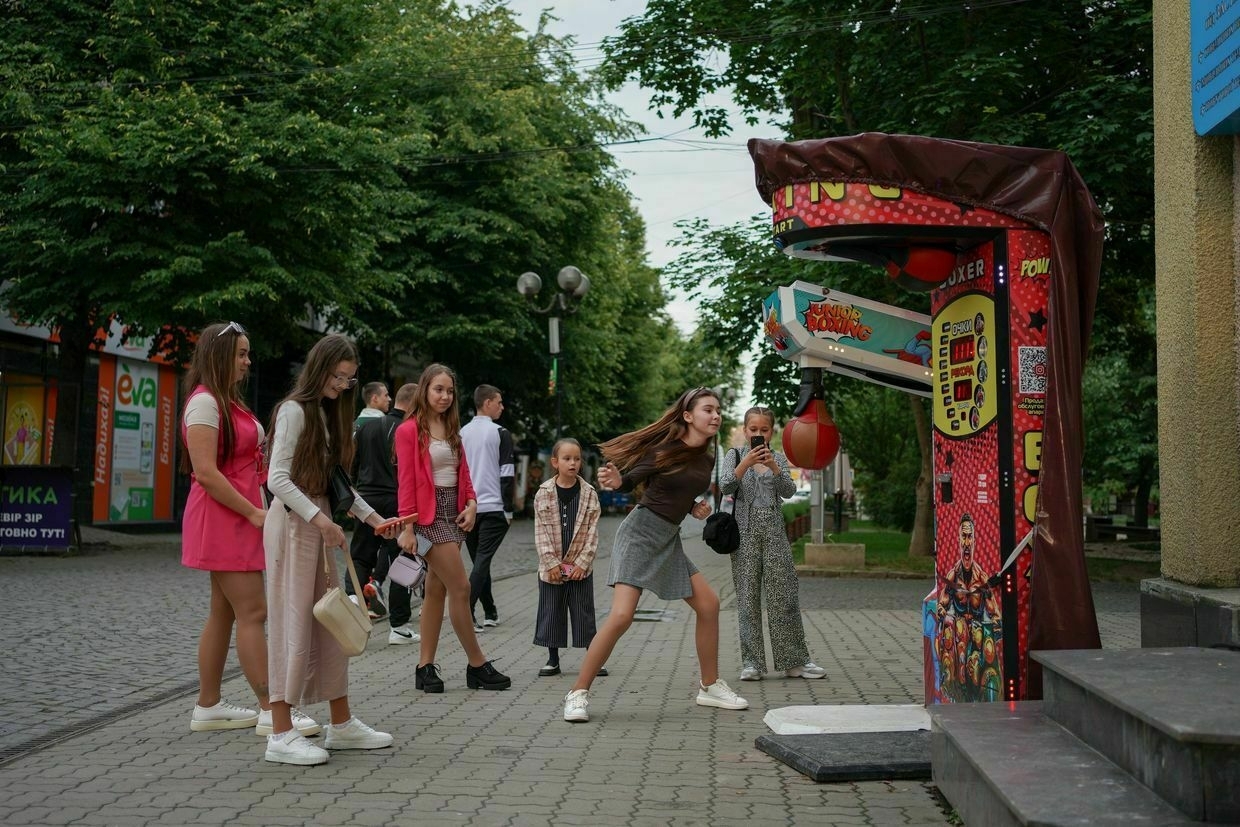
The geographical and historical proximity has forged a tight bond between Hungary and the region's Hungarians, and Budapest is making sure it remains so.
In the 2010s, Hungary sparked a diplomatic row with Kyiv by handing out its passports to local Hungarians. Many have accepted, enticed by the vision of better-paid employment in the EU. Some used double citizenship — which is not recognized by Ukrainian law — to receive higher pensions from Hungary while residing in Ukraine, locals say.
Through local civil society organizations, Hungary has been funding schools that teach in the Hungarian language, cultural events, and more, says Csilla Fedinec, senior research fellow at HUN-REN Center for Social Sciences in Budapest.
Zakarpattia's Hungarians "have their own newspapers, they have their own television in Hungarian," Andrii Liubka, researcher at the Institute for Central European Strategy (ICES) in Uzhhorod, tells the Kyiv Independent.
"Even when all media outlets are dying, and publishing is very costly, they continue to publish newspapers in Hungarian… to spread their agenda here, among the local community."
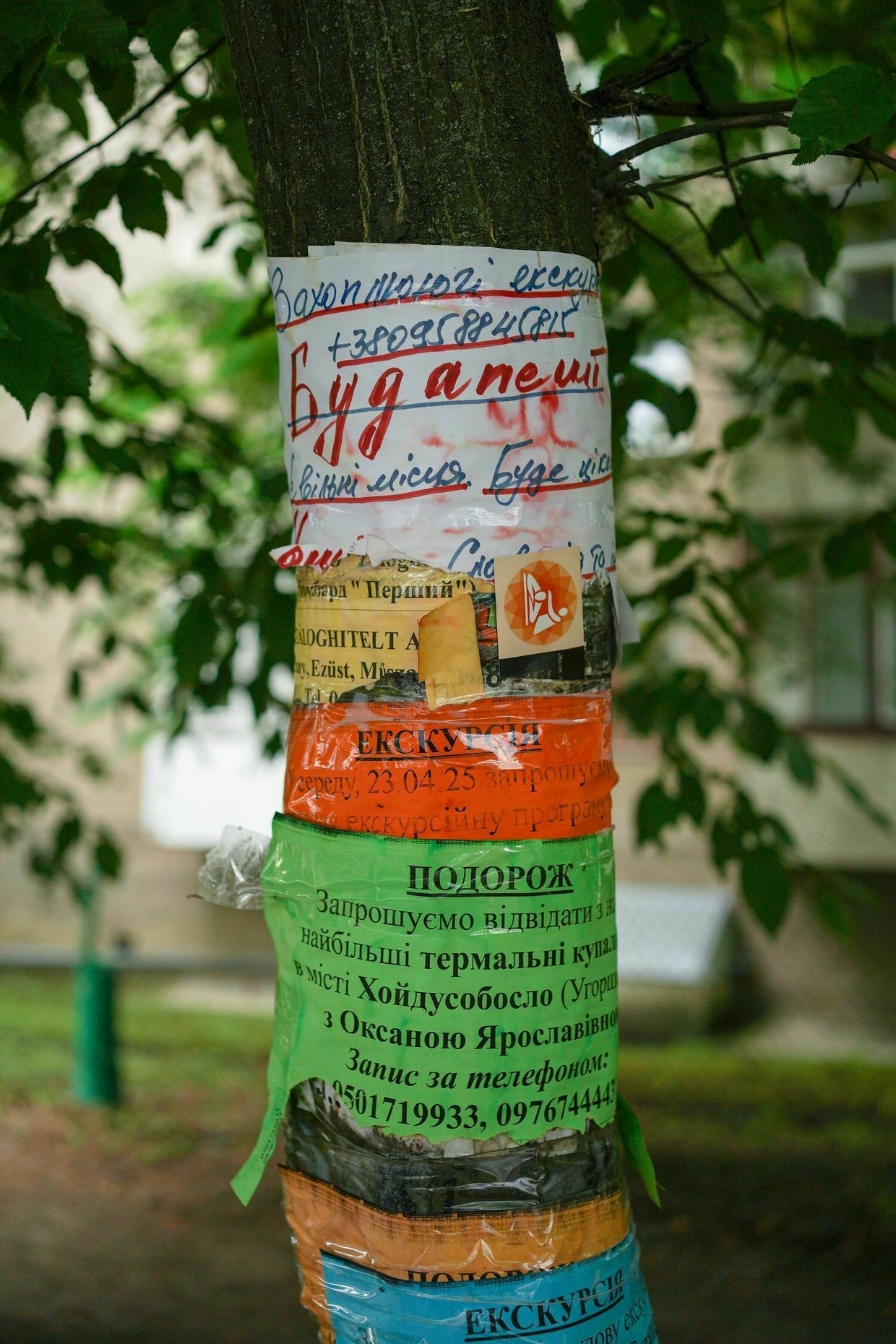

Surveys show that most of the Hungarian-language outlets in Zakarpattia are effectively controlled by Orban's media empire.
According to Liubka, the issue isn't Hungary's financial aid itself but that it's being used to build parallel social structures, making the community reliant on Orban's power network.
This has fostered an atmosphere of self-censorship, where political opinions are rarely expressed for fear of risking financial loss or attracting public backlash.
Fedinec notes that while "Hungary provides special support for Hungarians living in neighboring countries," this "also seems to require political allegiance with the Hungarian governing parties."
But there have been cases where the Hungarian community spoke out against Orban. In 2023, as Hungary was threatening to derail the launch of EU accession talks with Ukraine over the supposed curtailment of minority rights, Hungarian community leaders published an open letter to Orban not to block Ukraine's accession.
"Hungarians living in Zakarpattia — those who have not left — understand that they are connected to this country," says Vitalii Diachuk, researcher at ICES.
"By restricting Ukraine's right to join the EU, the Hungarian government is… closing some new opportunities for the Hungarian community. And the community understands this."
'We are no spies' — Fragile harmony of Berehove
Politics is no topic for the streets of Berehove. Questions about Orban are brushed aside — sometimes with suspicion, sometimes with amusement. "I don't listen to Orban," says Oksana Savula, a Ukrainian flower lady, with a smile.
"Politics is politics," comments Dmytro Kosmeda, a Ukrainian resident. His companion, Yurii Buzhak, adds: "Let's say that what is reported in the media does not reflect reality at all."
Asked about the relationship between the local Hungarian and Ukrainian communities, Yurii responds confidently: "There are absolutely no problems… There is no kind of prejudice against any nation."
"We have always lived here peacefully — that is, we have no political problems."
Dmytro's wife is Hungarian, and they use both languages at home. Though bilingualism seems common here, some of the local Hungarians shy away from answering, explaining that they cannot speak Ukrainian.
"I am Ukrainian, but we have been speaking Hungarian since birth," says Mykhailo Popovych, a man selling strawberries and homemade wine not far from the town's center. "We have always lived here peacefully — that is, we have no political problems."
Overhearing the discussion, a man at a neighboring stall quips, "We are no spies," subtly revealing what is on people's minds in the past weeks.
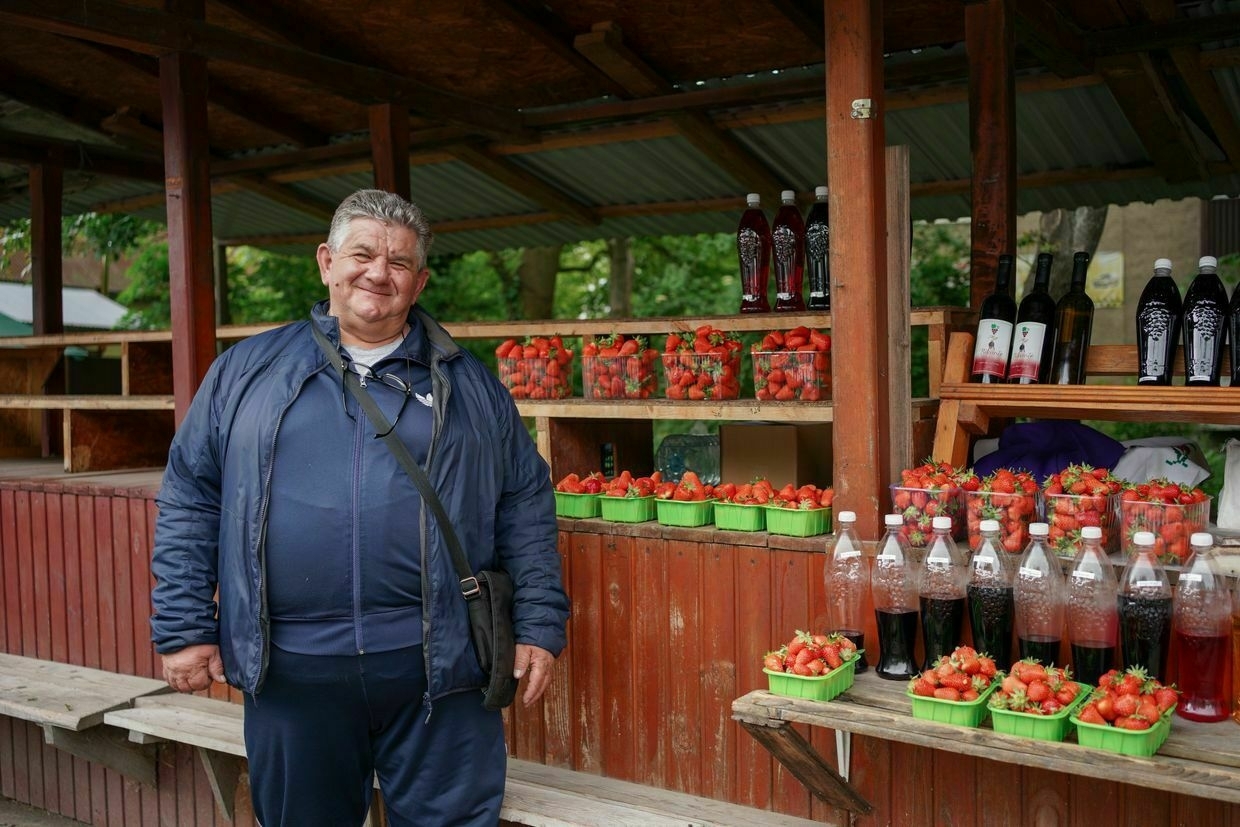
Most locals echo these sentiments, describing a harmonious cohabitation between Ukrainian and Hungarian speakers that coalesced into what some talk about as almost a separate identity: "Transcarpathian."
Encapsulating the town's nature, Berehove's central market is abuzz with Ukrainian, Hungarian, and Russian. Streets are lined with both Hungarian and Ukrainian flags, and shops bear signs in either or both languages.
"It doesn't bother me; it never has," says Viktoriia Skoropadska, a domestic products vendor at the bazaar, when asked about the different languages spoken in her hometown. She is ethnically Hungarian but answers in Ukrainian.
Only a "stupid, unintelligent person" can start a conflict because of language differences, she adds.
 The Kyiv IndependentNatalia Yermak
The Kyiv IndependentNatalia Yermak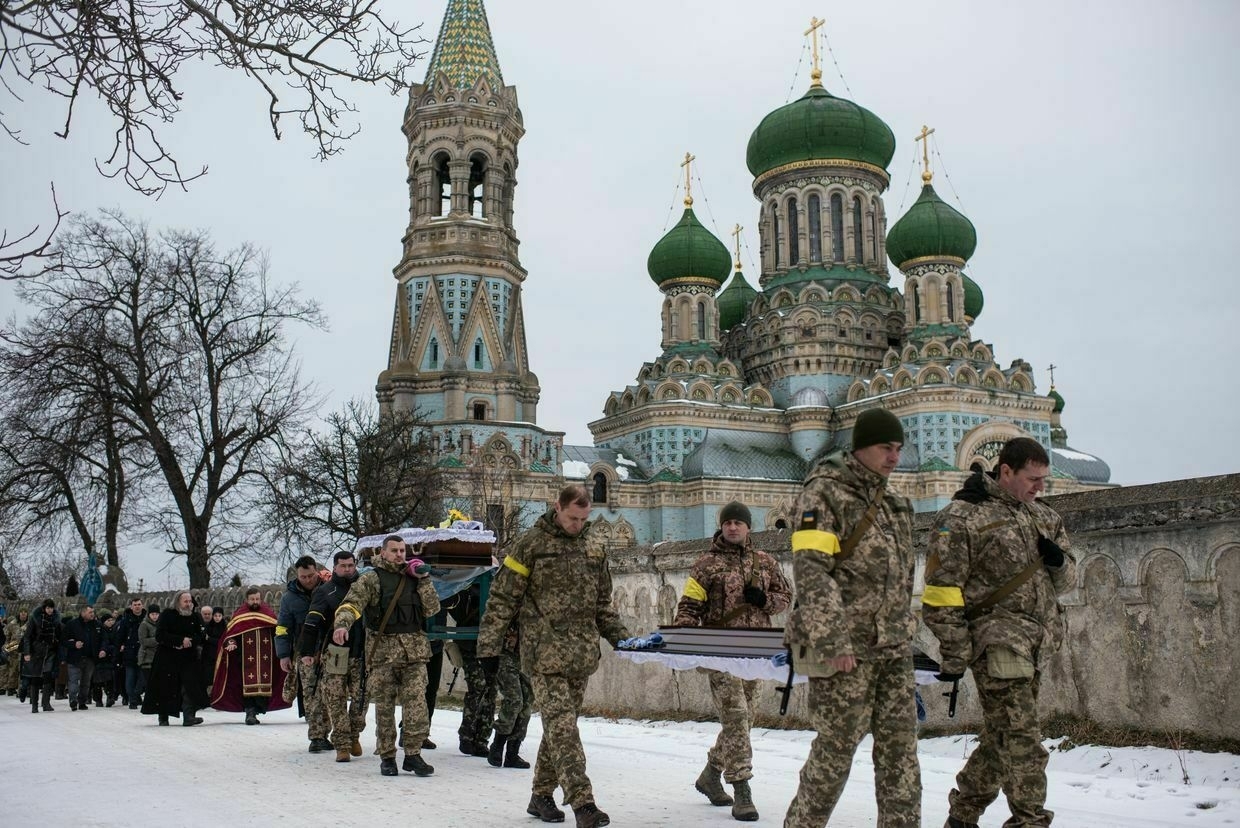
Migration, language, and Zakarpattia in flux
But no matter how cautious locals are in discussing politics, world events have had a major impact on the community.
Orban has consistently accused Ukraine of infringing on the rights of the Hungarian minority, focusing his criticism on the 2017 laws expanding the use of Ukrainian in education. The legislation — which is yet to enter into force — was designed to counter decades of Russification, but Budapest has cast it as discrimination against the Hungarian minority.
"People are afraid that these changes may cause their children to lose the opportunity to learn freely in their native language," Antipov says. "The Hungarian minority is worried about losing its linguistic identity and is afraid of assimilation."
It's not the language laws that are the threat to the Hungarian community: "it's depopulation."

A portrait of Andrii Liubka in the office of the Institute for Central European Strategy in Uzhhorod, Zakarpattia Oblast, Ukraine on May 22, 2025. (Elena Kalinichenko/The Kyiv Independent)
However, Liubka comments that it's not the language laws that are the threat to the Hungarian community: "it's depopulation."
While 150,000 residents declared themselves ethnic Hungarians in the 2001 census data, this number is believed to have dropped — as Liubka and Diatchuk say — to around 70,000-80,000. Many residents, especially the youth, have left for Hungary, with the migration only accelerated by the invasion.
For many, efforts to start a new life in Hungary have been challenging, suggesting some might return once the war is over, locals say.
"We, ethnic Hungarians from Zakarpattia, will always be foreigners in Hungary. We will be Ukránok (the Hungarian word for a Ukrainian)," Antipov says.
The war is also simultaneously bringing people from Ukraine's war-torn eastern regions, changing the societal fabric and causing tensions.
"Our Transcarpathians are practically gone now, everyone is newcomers, displaced persons, all strangers," says Andzhelika, a Ukrainian resident of Vynohradiv, a town 30 kilometers east of Berehove.
"Our people (Hungarians) have left Ukraine… Many families have been separated. Women are here, men over there," laments Andrea Grita, a Hungarian shopkeeper from Berehove.
Andrea says that her eldest daughter has lived in Hungary for six years. Her son, who will soon turn 18 — the age at which male citizens of Ukraine cannot leave the country during martial law — is studying there.
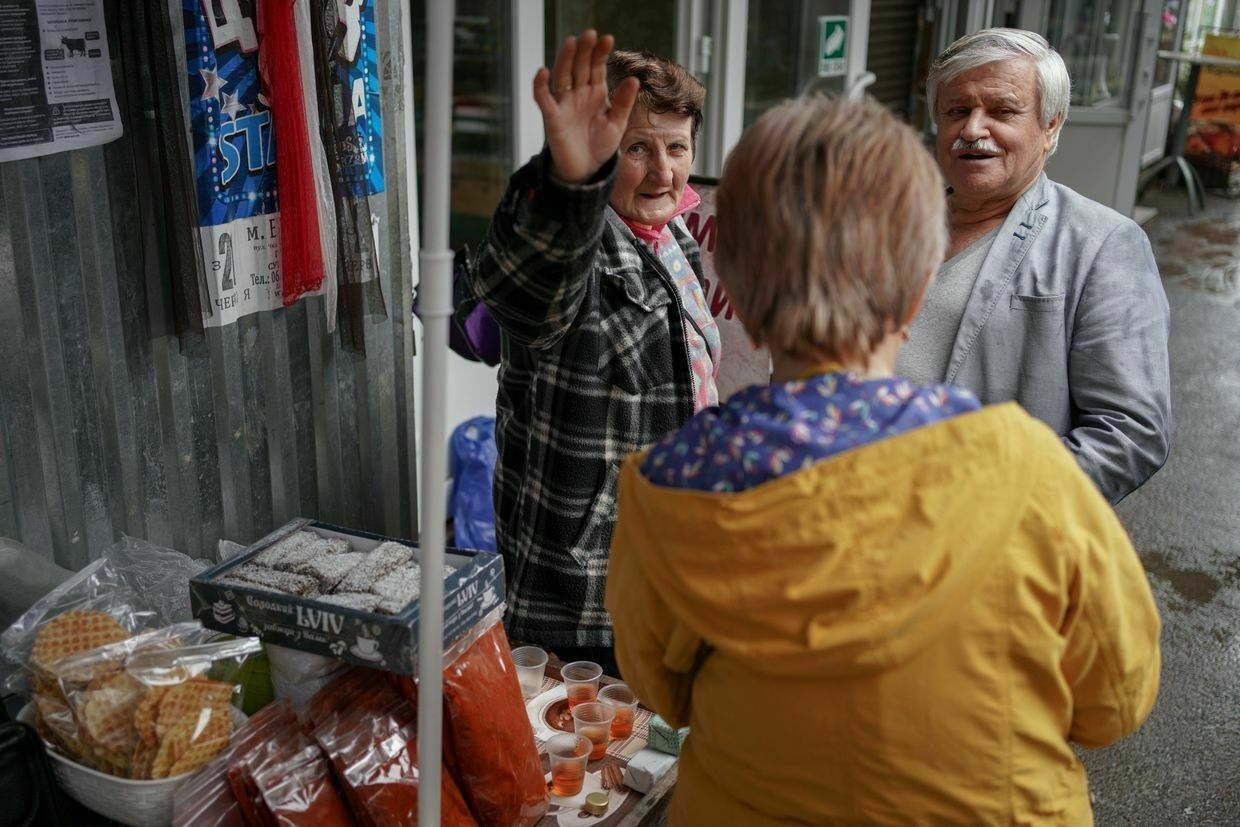
Some of the impacts are not unique to Zakarpattia. Many locals complain about rising prices and the economic downturn, or see newcomers with distrust.
"Since the war began, people don't help each other anymore. And everyone keeps quiet," says Zhanna Kokosh, a stallkeeper at the Berehove market. Holding both Hungarian and Ukrainian citizenship, she finds it difficult to classify her identity.
For Zhanna, the fighting itself feels distant. Her main concern is the hardship facing Berehove's elderly, the poor, and abandoned animals. A stray dog lies under her stall as she speaks.
"Nobody wants to fight. What for? Why should the boys be taken?" she asks. Zhanna expresses frustration that the town's poor are being overlooked while newcomers enjoy greater material security.
"They (newcomers) don't like it when we speak Russian or Hungarian," she adds. "But that's just how we speak... War or no war."
Anxieties of war
The Russian invasion has fueled anxieties among local Ukrainians, further fanned by disinformation.
Andzhelika mentions that only a few months after the start of the full-scale war, an unspecified Ukrainian media publication spread claims that Hungarian forces were massing near the border for an invasion.
In response, the locals organized regular patrols with dozens of cars, which — as the publication asserted — made "Orban afraid to send in troops here," Andzhelika adds. She herself voices uncertainty about the story, recalling she saw no Hungarian troops at the border at the time.
"They understand their connection to the state, the place they grew up, they live in… there are units with many Hungarians that are supported by Hungarian civil society organizations."
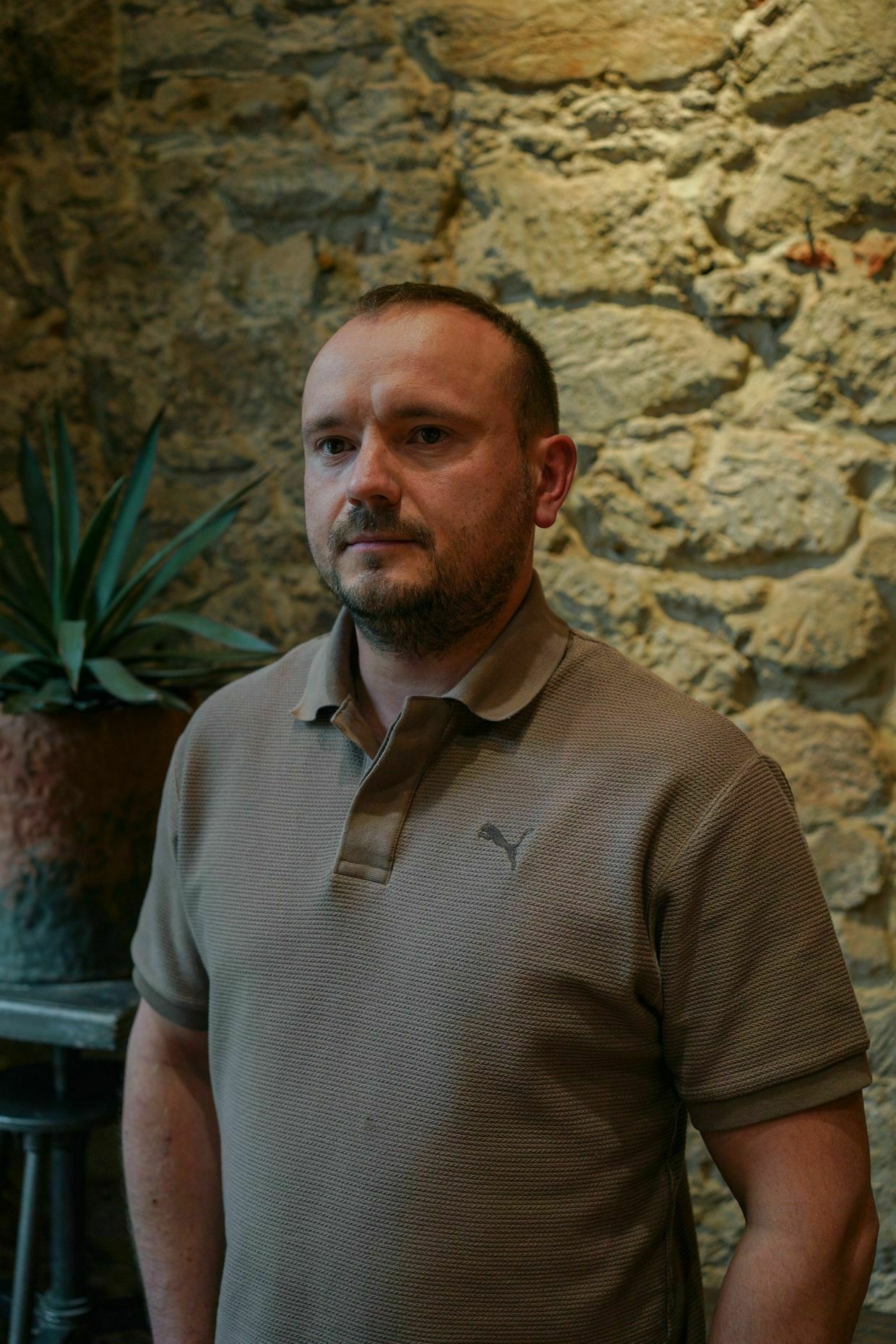
A portrait of Vitalii Diachuk in the office of the Institute for Central European Strategy in Uzhhorod, Zakarpattia Oblast, Ukraine on May 22, 2025. (Elena Kalinichenko/The Kyiv Independent)
The fears surged again after the detention of the suspected spy, who, as Andzhelika offhandedly mentions, worked at a stall not far from her and was known around Vynohradiv.
But the war has also impacted the community in a different way. While some may feel it distant, others are more personally involved — Viktoriia Skoropadska notes that her 54-year-old brother fought in the Zaporizhzhia sector for seven months.
Around 400 ethnic Hungarians have served in the ranks of Ukraine's Armed Forces during the full-scale war.
"They understand their connection to the state, the place they grew up, they live in… there are units with many Hungarians that are supported by Hungarian civil society organizations," Diatchuk says.

Others contribute to the struggle financially. Local initiatives and communities "allocate their budgets to support either specific units, or to purchase drones, or as one-time payments to mobilized community members," Liubka adds.
As before the war, the picture of the Hungarian community is one of many faces. In some cases, the Russian invasion and Orban's rhetoric stoked anxieties and division. For others, it was an incentive to take up arms to join what Antipov calls a "common struggle."
Whether fractured or galvanized, Zakarpattia's Hungarians must find their place in a region that is being deeply transformed by the war, migration, and the fallout of grand politics.
 The Kyiv IndependentYuliia Taradiuk
The Kyiv IndependentYuliia Taradiuk